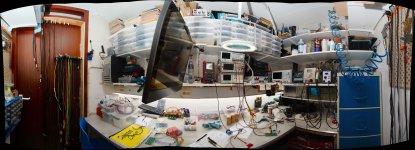My quarters were just on the other side of that pic, my room faced the Green Building. I remember the noise wars, with folks pitting their Bose/San-silly stereos against each other out their windows. IIRC someone fired up a chainsaw and dropped it into a 55 gal drum and declared victory.
Thanks!
Inquiring people want to see more. Any jewelry, gold bullions, diamonds to show? Your last bank statement will also be appreciated.
My quarters were just on the other side of that pic, my room faced the Green Building. I remember the noise wars, with folks pitting their Bose/San-silly stereos against each other out their windows. IIRC someone fired up a chainsaw and dropped it into a 55 gal drum and declared victory.
I'd like to shake that persons hand.
I have an entire shelf of records which sound like that!
Thanks!
Inquiring people want to see more. Any jewelry, gold bullions, diamonds to show? Your last bank statement will also be appreciated.
YES. OK.
.... coming ..... just wait for them.
-RM
Last edited:
Thanks!
Inquiring people want to see more. Any jewelry, gold bullions, diamonds to show? Your last bank statement will also be appreciated.
sure you don't want alarm codes, travel plans too?
sure you don't want alarm codes, travel plans too?
No, but I wouldn't mind a snapshot of that plutonium stash.
Selling DAC .. like new.... BenchMark DAC 2.
Take plutonium in trade.
First reasonable offer gets it.
THx-RNMarsh
Take plutonium in trade.
First reasonable offer gets it.
THx-RNMarsh
Selling DAC .. like new.... BenchMark DAC 2.
Take plutonium in trade.
First reasonable offer gets it.
THx-RNMarsh
125 mG
I'd like to shake that persons hand.
I have an entire shelf of records which sound like that!
Massona comes closest. The Japanese American Noise Treaty is a fun CD.
https://www.youtube.com/watch?v=_NoAD61uDEU
No, but I wouldn't mind a snapshot of that plutonium stash.
I'm afraid he'd have to use that Glock if he did.
I still find that exceptional audio quality is possible, and different from what is commonly discussed here, but it takes both research and funding to do it right. IC's won't cut it, and neither will typical power supplies made from data books, at least not for exceptional audio quality, unfortunately.
I still actively discuss circuit board material, capacitor quality, low feedback, Class A operation, etc, with others, but with few who contribute here. So much to learn and do. I still hope to make a few future examples that will represent the 'best' that I can do, much like I did in the past with Vendetta Research and the CTC Blowtorch.
I still actively discuss circuit board material, capacitor quality, low feedback, Class A operation, etc, with others, but with few who contribute here. So much to learn and do. I still hope to make a few future examples that will represent the 'best' that I can do, much like I did in the past with Vendetta Research and the CTC Blowtorch.
I disagree that IC's can't be used.
Do you prefer low feedback so you have less crossover distortion/lower order of harmonics, or just subjective sound? To me it seems speakers set the pace more so for the amount of desired feedback.
Still, the biggest problem is recordings.
Do you prefer low feedback so you have less crossover distortion/lower order of harmonics, or just subjective sound? To me it seems speakers set the pace more so for the amount of desired feedback.
Still, the biggest problem is recordings.
You can disagree if you want, but have you had any experience with highest quality discrete or tube circuits? If not, you have missed an experience, just the same as if you had never driven a real sports car, but instead only drove American sedans or pickups.
It is not 'cost effective' or even practical, but real hi fi can give an extra aural satisfaction that typical fi, you know IC's, etc can never give you.
I have been fighting the problem for decades, yet I have to revert to my Class A fet topologies almost always to get the best subjective performance. It is beyond standard measurements, because high feedback may give good results with Thd, etc, but still sound less good than more Class A designs. It is probably beyond today's typical audio measurements, and we will have to find some new ones that correlate better to what serious audio listeners really hear.
It is not 'cost effective' or even practical, but real hi fi can give an extra aural satisfaction that typical fi, you know IC's, etc can never give you.
I have been fighting the problem for decades, yet I have to revert to my Class A fet topologies almost always to get the best subjective performance. It is beyond standard measurements, because high feedback may give good results with Thd, etc, but still sound less good than more Class A designs. It is probably beyond today's typical audio measurements, and we will have to find some new ones that correlate better to what serious audio listeners really hear.
That seems pretty closed minded. If you don't know why IC's can't sound identical or better in clear terms of quantifiable output then its hard to support such general statements. There are areas where IC's have performance limits (noise, output swing) but there are also methods for addressing those limits. And aspects like matching of internal components can be better than possible using discrete parts.
If perception by people is the arbiter of quality then some aspects such as the thickness of the front panel have a significant impact even if they contribute little to the electrical performance. And following this perception as arbiter some aspects like acoustic feedback to a phono cartridge which should be bad may add to an improved perceived experience even if its a demonstrable degradation of the signal.
The ultra high end audio world seems as divorced from reality of music listening as the supercar world is from transportation. Both have more in common with the output of Cartier than Seiko. Actual accuracy or real world utility is subsumed by elements of "luxury" or as I tend to prefer, conspicuous consumption.
If one needs talismans and jewels to enjoy listening to music its fine by me but I will not hesitate to point out the talismans have little to do with music.
If perception by people is the arbiter of quality then some aspects such as the thickness of the front panel have a significant impact even if they contribute little to the electrical performance. And following this perception as arbiter some aspects like acoustic feedback to a phono cartridge which should be bad may add to an improved perceived experience even if its a demonstrable degradation of the signal.
The ultra high end audio world seems as divorced from reality of music listening as the supercar world is from transportation. Both have more in common with the output of Cartier than Seiko. Actual accuracy or real world utility is subsumed by elements of "luxury" or as I tend to prefer, conspicuous consumption.
If one needs talismans and jewels to enjoy listening to music its fine by me but I will not hesitate to point out the talismans have little to do with music.
If you don't know why IC's can't sound identical or better in clear terms of quantifiable output then its hard to support such general statements.
Sometimes measurably worse may sound perceptually better, but not usually. Don't know why that shouldn't be the case. People are complicated and hard to measure. John seems to be interested in some combination of measured-with-instrumentation and human-perceptual design goals. What he wants to optimize is not what is usually taught in engineering school, or any other university department. It is more of a cross-disciplinary pursuit, IMO.
For me this is quite the quandry. I have discrete circuits with exceptional performance. They have passed the "reviewer" tests. In sighted listening they sound better than anything else. But in straight electrical testing of all manner of parameters they only outperform IC's in a few ways, most of which are well below any known perceptual threshold. further in blind testing I'm not convinced they bring benefits.
You could call this a crisis in faith/belief. Its seems a lot of high end audio is more faith than objective reality. Somehow that flies in the face of the core mission which is to reproduce a record of someone's musical work, a straightforward definable task.
You could call this a crisis in faith/belief. Its seems a lot of high end audio is more faith than objective reality. Somehow that flies in the face of the core mission which is to reproduce a record of someone's musical work, a straightforward definable task.
further in blind testing I'm not convinced they bring benefits.
Any benefits may be quite small, in a measurable engineering sense.
May I ask about the blind testing methodology used?
- Status
- Not open for further replies.
- Home
- Member Areas
- The Lounge
- John Curl's Blowtorch preamplifier part II


